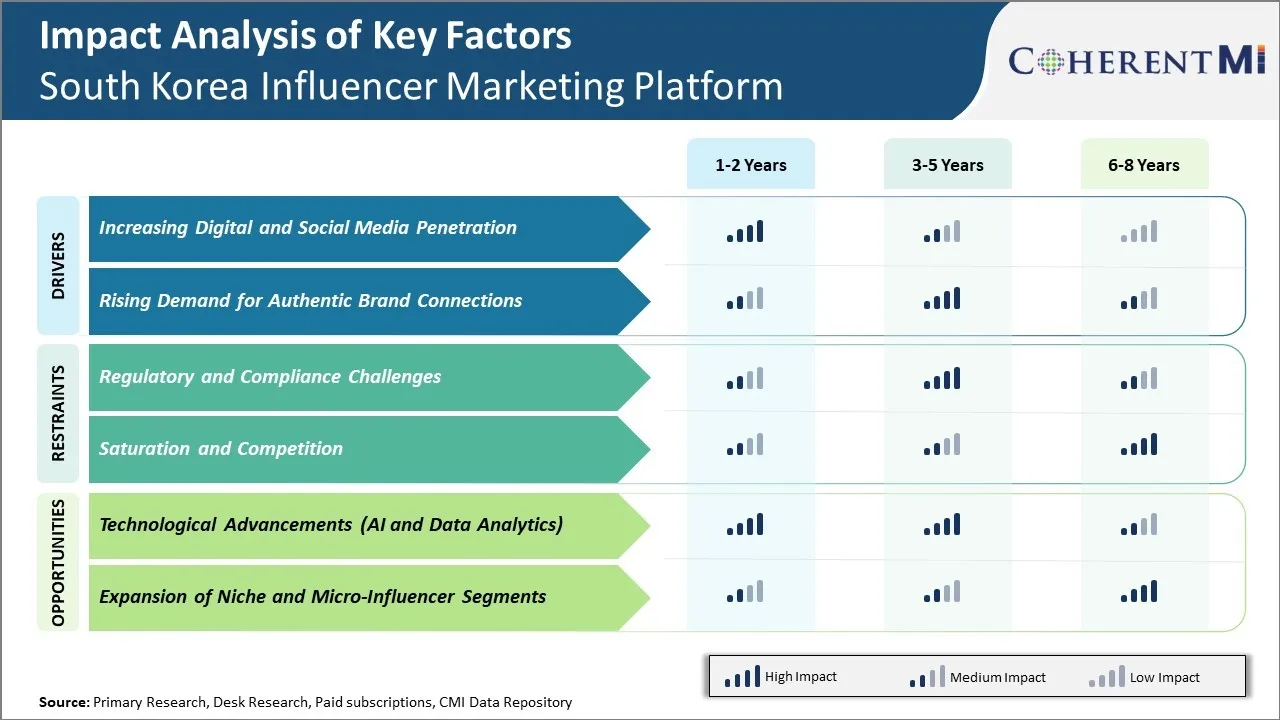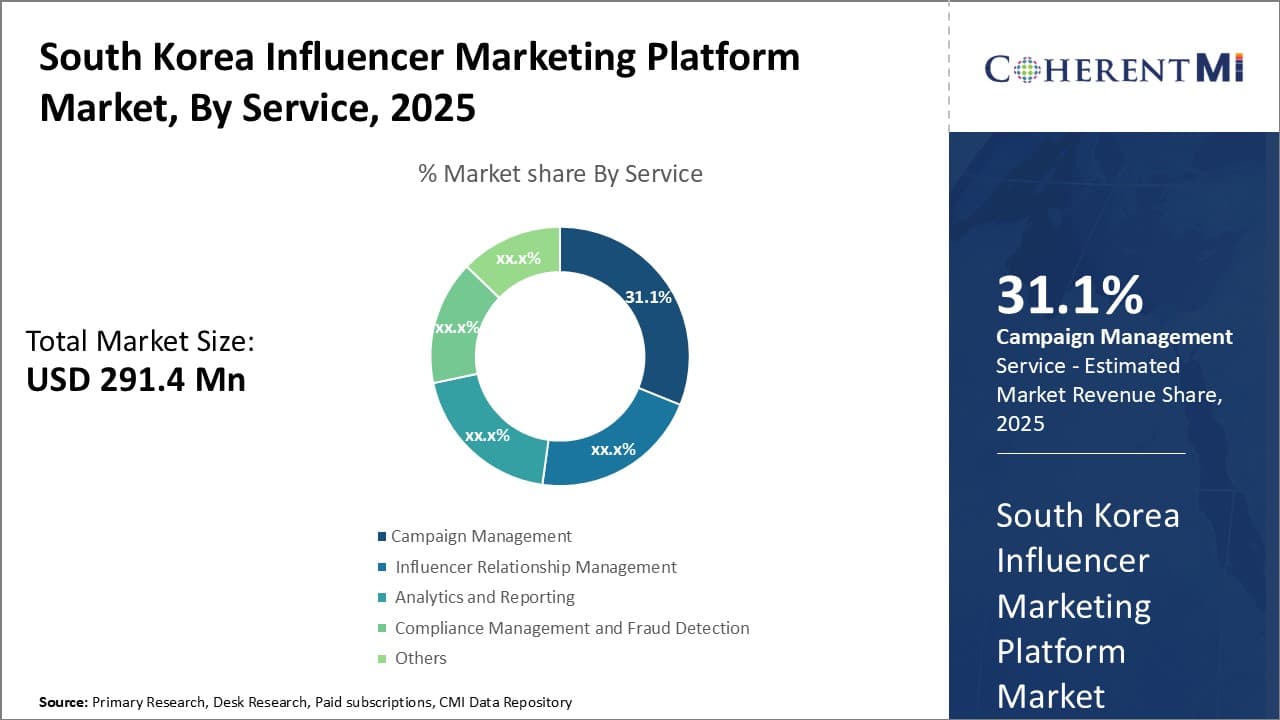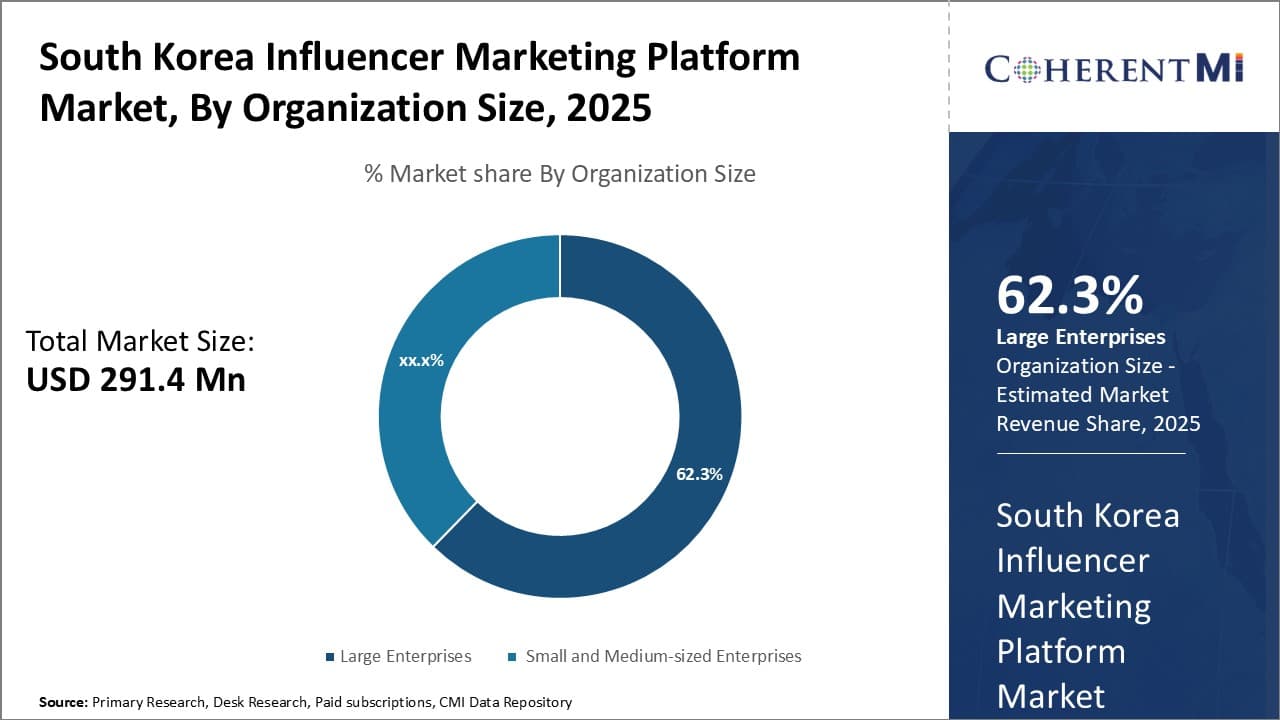South Korea Influencer Marketing Platform Market Size - Analysis
The South Korea Influencer Marketing Platform Market is estimated to be valued at USD 291.4 Mn in 2025 and is expected to reach USD 1241.2 Mn by 2032, growing at a CAGR of 23.00% from 2025 to 2032.
Influencer marketing continues to grow in popularity among brands and marketers in South Korea as an effective way to promote products and services through trusted voices.
Market Size in USD Mn
CAGR23.00%
| Study Period | 2025-2032 |
| Base Year of Estimation | 2024 |
| CAGR | 23.00% |
| Market Concentration | High |
| Major Players | TikTok Creator Marketplace, AJ Marketing, KOLsquare, Linfluencer, Mavive and Among Others |
please let us know !
South Korea Influencer Marketing Platform Market Trends
Market Driver – Increasing Digital and Social Media Penetration
With the widespread use of digital technologies and rising penetration of social media in South Korea, influencer marketing is becoming an integral part of the marketing strategy of many brands. According to data from the Korea Internet & Security Agency, as of 2023, approximately 98% of the South Korean population use the internet on a regular basis. Social media penetration is equally high, with around 90% active social media users in the country.
This high digital and social media engagement among consumers has made South Korea a ripe market for influencer marketing. Many global brands and local companies are actively partnering with influencers on platforms like Instagram, YouTube, and Facebook to promote their products and services. Influencers have strong engagement with their niche audience and can help brands create customized and targeted marketing campaigns. Various types of influencers ranging from celebrities, micro-influencers to nano-influencers are being leveraged to promote different kinds of brands and services.
This increasing reliance on influencer marketing is fueling the growth of dedicated influencer marketing platforms in South Korea.
Market Driver – Rising Demand for Authentic Brand Connections
The rapidly evolving brands and marketing landscape is fueling demand for authentic connections with consumers in South Korea. As consumers increasingly seek personalized experiences and value transparency from the brands they engage with, influencer marketing has emerged as a powerful tool for brands to build trust and gain cultural relevance. Influencers with niche expertise and engaged followership are able provide brand messaging that feels genuine and relatable versus traditional advertising.
More and more brands are acknowledging that purchasing decisions are greatly impacted by peer recommendations delivered through influencers. As a result, they are dedicating significant portions of their marketing budgets to influencer campaigns. Platforms that facilitate collaboration between brands and relevant influencers are seeing widespread adoption. They help match brands to influencers based on target audiences, history of campaign success, and other criteria that maximize authentic engagement.
Several data points indicate the rapid growth of influencer marketing and associated platforms. According to a Korea Communications Commission report, daily time spent on social networks by South Koreans grew from 160 minutes in 2019 to over 180 minutes in 2021, highlighting increased exposure to influencer content.
 To learn more about this report, Download Free Sample Copy
To learn more about this report, Download Free Sample Copy
Market Challenge – Regulatory and Compliance Challenges
Regulatory and compliance challenges are presenting some significant restraints on the growth of the South Korea influencer marketing platform market. With new regulations being introduced around data privacy and the use of personal information, platform operators are finding it difficult to utilize influencer data and run targeted campaigns. This has reduced the effectiveness of influencer marketing initiatives to some extent.
The Personal Information Protection Act that was passed in Korea in 2020 has tightened the rules around how personal data can be collected and used. Platforms are now required to get explicit consent from all influencers to collect and process their data for ad targeting and campaign management. This has increased legal liability for the platforms. Many smaller influencers are also reluctant to share detailed personal profiles due to privacy concerns. As a result, platforms have limited data that can be used to connect advertisers with the most relevant influencers, impacting campaign success rates.
Another challenge comes from regulations on disclosures and labeling of paid partnerships between influencers and brands. The Fair Transactions in Online Influencing Act of 2021 mandated that influencers and platforms disclose any paid advertising deals transparently.
Market Opportunity – Technological Advancements (AI and Data Analytics)
Technological advancements in artificial intelligence and data analytics present a great opportunity for the influencer marketing platform market in South Korea. As AI and data analytics become more sophisticated, platform companies can utilize these technologies to more effectively connect brands with the optimal influencers.
AI and data analytics allow platforms to gain deeper insights into both influencers and their audiences. Platforms can analyze an influencer's content, engagement rates, demographics of their followers, purchasing behaviors, and interests to develop a comprehensive understanding of their influence. This rich data makes it possible to precisely match brands with the influencers whose specific audience best fits the goals and values of that brand. AI can also recognize trends and predict which new influencers are gaining prominence.
By analyzing the massive amounts of data on users' internet activities and purchase histories, platforms can gain deep insights into target audiences. This enables highly personalized recommendations of influencers to advertisers based on the interests of their ideal customers. Brands will know not only which influencers are likely to resonate with their audiences but exactly which posts, stories, or other content pieces are most appropriate for specific campaigns.
Segmental Analysis of South Korea Influencer Marketing Platform Market
 To learn more about this report, Download Free Sample Copy
Insights, By Service: Enhanced Visibility and Optimization Capabilities of Campaign Management
To learn more about this report, Download Free Sample Copy
Insights, By Service: Enhanced Visibility and Optimization Capabilities of Campaign Management
In terms of service, campaign management sub-segment contributes the highest share of 31.1% in the market owing to enhanced visibility and optimization capabilities.
Campaign management has emerged as the leading service segment in the South Korea influencer marketing platform market due to its ability to boost visibility and maximize results for brands. Campaign management tools provide robust functionality for identifying suitable influencers, launching Branded content partnerships, and measuring key performance metrics. This holistic approach addresses the core needs of brands to strengthen awareness, boost engagement, and drive real business outcomes through influencer campaigns.
A key driver of the campaign management segment is the emphasis on optimization. Platforms provide advanced analytics and reporting capabilities to help brands refine future campaigns based on learnings. This data-driven approach allows constant improvement of influencer selection, content formats, hashtags, etc. to maximize the return on investment. The visibility and engagement benefits of well-optimized influencer campaigns have convinced more brands to invest in campaign management as their primary service.
Ease of use is another major factor propelling the campaign management segment. User-friendly interfaces and project management features take the hassle out of coordinating campaigns. This accessibility is vital for smaller brands with limited marketing budgets and resources.
 To learn more about this report, Download Free Sample Copy
To learn more about this report, Download Free Sample Copy
Insights, By Organization Size: Extensive Marketing Budgets and Complex Requirements of Large Enterprises
In terms of organization size, large enterprises sub-segment contributes the highest share of 62.3% in the market owing to extensive marketing budgets and complex requirements.
Large enterprises account for the major share of the South Korea influencer marketing platform market in terms of organization size due to their sizable marketing budgets and diverse campaign needs. Influencer marketing provides a cost-effective yet high impact way for these companies to reach their extensive customer bases.
Compared to SMEs, large conglomerates require platforms that can support complex, multi-market campaigns involving hundreds of influencers. They demand higher security, robust administrative controls for delegating tasks, and detailed reporting across multiple KPIs. Only the most full-featured enterprise-grade platforms are equipped to handle such intensive requirements. Additionally, large enterprises can afford advanced add-on services like dedicated success coaching and consultancy.
With campaigns targeting international as well as local audiences, data protection and compliance are paramount concerns for brands. Enterprise platforms provide bank-grade security with features such as bank-level encryption, rigorous authentication protocols, and regular third-party security audits. These robust security implementations give large enterprises the peace of mind required to entrust their high-stake campaigns.
Competitive overview of South Korea Influencer Marketing Platform Market
The major players operating in the South Korea Influencer Marketing Platform Market include AJ Marketing, KOLsquare, Linfluencer, Mavive, PostPick, Socia, WeMakeStars, Ppoyogi, CreatorOS by Kakao, and TikTok Creator Marketplace.
South Korea Influencer Marketing Platform Market Leaders
- TikTok Creator Marketplace
- AJ Marketing
- KOLsquare
- Linfluencer
- Mavive
Recent Developments in South Korea Influencer Marketing Platform Market
- In November 2023, AnyMind Group, a technology firm specializing in business supply chains, announced its entry into South Korea. They opened an office in Seoul to assist South Korean businesses in expanding internationally, while also building their local networks within the country.
- In August 2022, U-Connec, a YouTube influencer platform in South Korea, introduced a new product called YouTube Shorts Experience Group. This product allows for securing multiple reviews and additional advertising materials simultaneously, at a cost-effective rate.
South Korea Influencer Marketing Platform Market Segmentation
- By Service
- Campaign Management
- Influencer Relationship Management
- Analytics and Reporting
- Compliance Management and Fraud Detection
- Others (Workflow Automation and Time Management, etc.) (Workflow Automation and Time Management, etc.)
- By Organization Size
- Large Enterprises
- Small and Medium-sized Enterprises (SMEs)
- By End-use
- Food & Entertainment
- Sports & Fitness
- Travel & Holiday
- Fashion & Lifestyle
- Others
Would you like to explore the option of buying individual sections of this report?
Monica Shevgan has 9+ years of experience in market research and business consulting driving client-centric product delivery of the Information and Communication Technology (ICT) team, enhancing client experiences, and shaping business strategy for optimal outcomes. Passionate about client success.
